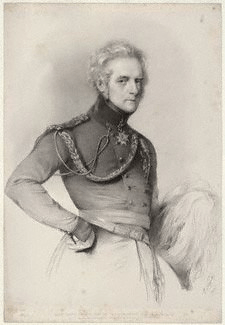Edward Blakeney facts for kids
Quick facts for kids
Sir Edward Blakeney
|
|
|---|---|

Sir Edward Blakeney
|
|
| Born | 26 March 1778 Newcastle upon Tyne, England |
| Died | 2 August 1868 (aged 90) Chelsea, London, England |
| Allegiance | |
| Service/ |
|
| Years of service | 1794–1855 |
| Rank | Field Marshal |
| Commands held | Commander-in-Chief of Ireland |
| Battles/wars | French Revolutionary Wars Peninsular War War of 1812 |
| Awards | Knight Grand Cross of the Order of the Bath Knight Grand Cross of the Royal Guelphic Order |
| Other work | Governor of Royal Hospital Chelsea |
Field Marshal Sir Edward Blakeney (26 March 1778 – 2 August 1868) was an important officer in the British Army. He had a very long military career, serving for over 60 years! He fought in many big wars, including the Peninsular War and the War of 1812. Later in his life, he became the Commander-in-Chief, Ireland, which was a very high position. He was known for his bravery and leadership in battle.
Contents
Early Military Adventures
Edward Blakeney was born in Newcastle upon Tyne, England, on March 26, 1778. He was the fourth son of Colonel William Blakeney. Edward started his army career very young, joining the 8th Light Dragoons in 1794 when he was just 16.
His early years in the army were full of challenges. He went on an expedition to Dutch Guiana in 1796. During this time, he was captured by privateers (like pirates working for a government) three times! He also helped with the evacuation of Santo Domingo in 1798.
In 1799, he took part in the Anglo-Russian invasion of Holland. He fought in several battles there, including the Battle of Krabbendam and the Battle of Bergen. He was promoted to major in 1801. Later, in 1807, he joined an expedition to Denmark and fought in the Battle of Copenhagen. He was promoted to lieutenant colonel in 1808 and helped capture Martinique in 1809.
Fighting in the Peninsular War
One of the most important parts of Sir Edward Blakeney's career was his time in the Peninsular War. This war was fought in Spain and Portugal against Napoleon's French army. Blakeney joined Sir Arthur Wellesley (who later became the Duke of Wellington) in Spain in 1810.
He commanded the 2nd Battalion of his regiment, the 7th Regiment of Foot. He showed great courage in many battles:
- At the Battle of Bussaco in September 1810.
- At the Battle of Albuera in May 1811, where he was badly wounded in his thigh.
- He commanded both battalions of his regiment at the Siege of Ciudad Rodrigo in January 1812.
- At the Siege of Badajoz in April 1812, he was severely wounded again, this time in his arm.
- He also led his troops at the Battle of Vitoria in June 1813.
- And at the Battle of the Pyrenees in July 1813.
- Finally, at the Battle of Nivelle in November 1813.
After these battles, he was promoted to colonel in 1814. He was also made a Knight Commander of the Order of the Bath, which is a special honor.
War of 1812 and Later Service
After the Peninsular War, Sir Edward Blakeney fought in the War of 1812 against the United States. He took part in the Battle of New Orleans in January 1815.
Even though he wasn't at the famous Battle of Waterloo, he joined the Duke of Wellington when the army marched into Paris in 1815. He stayed with the army in France until 1819.
In 1825, he was promoted to major general. He then commanded a group of soldiers sent to Portugal in 1826. Their job was to support the government against forces trying to take over.
Commander-in-Chief of Ireland
One of Sir Edward Blakeney's most important roles was becoming Commander-in-Chief, Ireland in 1836. This meant he was in charge of all the British Army forces in Ireland. He held this important position for almost 20 years!
During this time, he received more promotions and honors:
- He became a Lord Justice of Ireland in 1836.
- He was promoted to lieutenant-general in 1838.
- He became a Knight Grand Cross of the Bath in 1849.
- He was promoted to full general in 1854.
He finally retired from active military service in 1855.
Retirement and Final Years
Even after retiring from active duty, Sir Edward Blakeney continued to serve. He became the lieutenant-governor of the Royal Hospital Chelsea in 1855. This hospital is a home for old soldiers. A year later, in 1856, he became the Governor of the Royal Hospital Chelsea.
He also held honorary positions with several regiments, showing his long and respected career. In 1862, he received his highest promotion: Field Marshal. This is the highest rank in the British Army.
Sir Edward Blakeney lived at Richmond House in Twickenham during his retirement. He passed away at the Royal Hospital Chelsea on August 2, 1868, at the age of 90. He was buried in Twickenham.
Family Life
In 1814, Sir Edward Blakeney married Maria Gardiner. She was the daughter of Colonel Gardiner, who worked for the East India Company. They did not have any children.
Images for kids
-
The Battle of Nivelle: Blakeney commanded the 7th Regiment of Foot at this battle in November 1813
 | Claudette Colvin |
 | Myrlie Evers-Williams |
 | Alberta Odell Jones |


